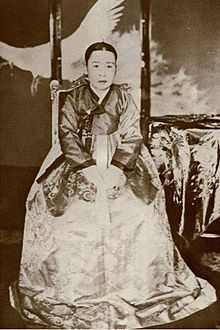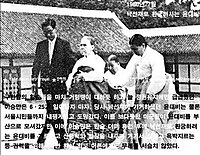Empress Sunjeong
This article needs additional citations for verification. (April 2008) |
| Empress Sunjeonghyo 순정효황후 | |||||
|---|---|---|---|---|---|
 15-16 year old Empress Sunjeonghyo, ca. 1910 | |||||
| Queen Dowager Yi of Korea | |||||
| Pretender | 24 April 1926 - 15 August 1945 | ||||
| Predecessor | Queen Hyojeong | ||||
| Successor | None | ||||
| Queen Yi of Korea | |||||
| Pretender | 29 August 1910 - 24 April 1926 | ||||
| Predecessor | Empress title abolished | ||||
| Successor | Crown Princess Euimin | ||||
| Empress Consort of Korea | |||||
| Reign | 23 July 1907 - 29 August 1910 | ||||
| Predecessor | Empress Myeongseong | ||||
| Successor | Empress title demoted | ||||
| Crown Princess of Korea | |||||
| Reign | 24 January 1907 - 23 July 1907 | ||||
| Predecessor | Crown Princess Min | ||||
| Successor | Crown Princess Euimin | ||||
| Born | 19 September 1894 Munho-ri, Seojong-myeon, Yangpyeong County, Gyeonggi Province, Joseon Dynasty (now South Korea) | ||||
| Died | 3 February 1966 (aged 71) Nakseon Hall, Changdeok Palace, Jongno District, Seoul, South Korea | ||||
| Burial | |||||
| Spouse | |||||
| |||||
| House | Haepyeong Yun | ||||
| Father | Yun Taek-yeong | ||||
| Mother | Internal Princess Consort Gyeongheung of the Gigye Yu clan | ||||
| Religion | Buddhism | ||||
| Korean name | |
| Hangul | 순정효황후 |
|---|---|
| Hanja | 純貞孝皇后 |
| Revised Romanization | Sunjeong Hyo Hwang-hu |
| McCune–Reischauer | Sunjŏng Hyo Hwang-hu |
| Birth name | |
| Hangul | 윤증순 |
| Hanja | 尹曾順 |
| Revised Romanization | Yun Jeung-sun |
| McCune–Reischauer | Yun Chŭng-sun |

Empress Sunjeonghyo (Hangul: 순정효황후, Hanja: 純貞孝皇后; 19 September 1894 – 3 February 1966[1]), of the Haepyeong Yun clan, was the second wife and Empress Consort of Emperor Yunghui, the last emperor of the Korean Empire.
Biography[]
Early life[]
Empress Sunjeong was born as Lady Yun, or Yun Jeung-sun (Hangul: 윤증순, Hangja: 尹曾順), in Seoul to Lady Yu of the Gigye Yu clan and Marquis Yun Taek-yeong, the Lord of the Haepyeong Yun clan. Yun Bo-seon, the 2nd president of the Republic of Korea, was her ninth cousin three times removed. Her mother was given the royal title of "Internal Princess Consort Kyeongheung of the Gigye Yun clan, Princess Consort to the Internal Prince" (Hangul: 경흥부부인 기계 유씨, Hanja: 慶興府夫人 杞溪 兪氏) and her father was given the royal title of "Internal Prince Haepung, Yun Taek-yeong" (Hangul: 해풍부원군, 윤택영, Hanja: 海豊府院君 尹澤榮) when she became Crown Princess Consort.
Yun Jeung-sun married Crown Prince Cheok, who was 20 years her senior, on 24 January 1907 at the age of 13 after his first wife, Crown Princess Consort Min, died on 5 November 1904. On 20 July 1907, she became Empress Consort of Korea when her husband ascended the throne after the forced abdication of his father, Emperor Gwangmu. The Empress was demoted by the Japanese government by the Japan-Korea Annexation Treaty of 1910 and thereafter officially known as Her Majesty, Queen Yi of Korea (this title, however, was ignored in Korea).
Empress Sunjeong became a widow on 24 April 1926, when Emperor Yunghui died without issue at the Changdeok Palace in Seoul. Emperor Yunghui had been rendered infertile (and was also said to be mentally disabled) by poisoning in the [2][3][citation needed]
Korean War[]
During the Korean War, Empress Sunjeong stayed in Changdeok Palace as long as she could in the face of advancing forces from North Korea. During the war, the soldiers of North Korea invaded the palace but she reproved them and drove them all out. She then escaped secretly to the Unhyeon Palace when the war situation became too serious. As the war progressed, she moved to Busan with other Imperial family members, including Princess Hui (wife of Prince Wanheung). According to The World is One, Princess Yi Bangja's autobiography, Empress Sunjeong went to Busan on foot.
After the Korean War[]

After the war, the new government of President Rhee Syng-man, jealous of the popularity of the Imperial House, prevented Empress Sunjeong from entering the Changdeok Palace. She was kept imprisoned in Suin Hall, a narrow and unsuitable cottage in Jeongneung, Seoul. After a change in government in 1961 she returned to Nakseon Hall, Changdeok Palace with her dutiful ladies-in-waiting: Park Chang-bok (d.1981), Kim Myung-gil (d.1983) and Sung Ok-yeom (d.2001), and five other staff.
Empress Sunjeong became a Buddhist in her later years. She died childless on 3 February 1966, aged 72, at Nakseon Hall, Changdeok Palace, Seoul from a heart attack. She was given a state funeral and a private Buddhist funeral. She is buried beside her husband, Emperor Yunghui and his first wife, Empress Sunmyeong, at the Yureung.
She is known posthumously as Empress Sunjeong of Korea (officially, 純貞孝皇后, 순정효황후; Sunjeonghyo Hwanghu; Empress Sunjeonghyo).
Titles[]

- 19 September 1894 - 24 January 1907: Yun Jeung-sun, daughter of Yun Taek-yeong of the Hapyeong Yun clan
- 24 January 1907 - 20 July 1907: Her Imperial Highness, Crown Princess Consort Yun of Korea (황태자비 윤씨, 皇太子妃 尹氏)
- 20 July 1907 - 29 August 1910: Her Imperial Majesty, the Empress of Korea (황후, 皇后)
- 29 August 1910 - 24 April 1926: Her Majesty, Queen Consort Yi of Korea (이왕비, 李王妃)
- 24 April 1926 - 15 August 1945: Her Majesty, Queen Dowager Yi of Korea (이왕대비, 李王大妃)
- Posthumous title: Empress Sunjeonghyo of Korea (순정효황후, 純貞孝皇后)
Family[]
- Great-Great-Great-Great-Great-Great-Grandfather
- Yun Sang-myeong (윤상명, 尹商明)
- Great-Great-Great-Great-Great-Grandfather
- Yun Deuk-il (윤득일, 尹得一)
- Great-Great-Great-Great-Grandfather
- Yun Myeon-dong (윤면동, 尹冕東)
- Great-Great-Great-Grandfather
- Yun Myeong-ryeol (윤명렬, 尹命烈)
- Great-Great-Grandfather
- Great-Great-grandmother
- Lady Jo of the Pungyang Jo clan (정경부인 조씨, 貞敬夫人 趙氏) (1794 - 1875) (본관: 풍양 조씨, 豊壤 趙氏)
- Great-grandfather
- Yun Wi-seon (윤위선, 尹爲善)
- Adoptive great-grandfather: Yun Yong-seon (윤용선, 尹容善) (1829 - 1904)[6]
- Adoptive great-grandmother: Lady Kim of the Andong Kim clan (정경부인 안동 김씨, 貞敬夫人 金氏) (1826 - 1879)
- Yun Wi-seon (윤위선, 尹爲善)
- Grandfather
- Yun Cheol-gu (윤철구, 尹徹求)
- Grandmother
- Lady Hong (정경부인 홍씨)
- Father
- Yun Taek-yeong (윤택영, 尹澤榮) (1876 - 24 October 1935)
- Uncle: Yun Deok-yeong (윤덕영, 尹德榮) (27 December 1873 - 18 October 1940)
- Aunt: Kim Bok-soo (김복수, 金福綏) (2 December 1872 - 10 June 1950)
- Yun Taek-yeong (윤택영, 尹澤榮) (1876 - 24 October 1935)
- Mother
- Internal Princess Consort Gyeongheung of the Gigye Yu clan (경흥부부인 기계 유씨, 慶興府夫人 杞溪 兪氏) (1866 - 1936)
- Maternal Grandfather: Yu Jin-hak (유진학); adoptive nephew of Queen Shinjeong
- Internal Princess Consort Gyeongheung of the Gigye Yu clan (경흥부부인 기계 유씨, 慶興府夫人 杞溪 兪氏) (1866 - 1936)
- Siblings
- Older brother: Yun Hong-seop (윤홍섭, 尹弘燮)
- Sister-in-law: Han Yoo-sang (한유상)
- Sister-in-law: Lee Yong-suk (이용숙)
- Younger brother: Yun Ui-seop (윤의섭, 尹毅燮) (8 March 1912 - 25 February 1966); succeeded his father in becoming Marquis
- Sister-in-law: Kim Hyeon-jeong (김현정) (1917 - 1957)
- Younger sister: Yun Hee-seop (윤희섭, 尹喜燮) (6 November 1905 - ?)
- Brother-in-law: Yu Eok-gyeom of Gigye Yu clan (유억겸, 兪億兼) (23 October 1895 - 8 November 1947) (본관: 기계 유씨, 杞溪 兪氏)
- Older brother: Yun Hong-seop (윤홍섭, 尹弘燮)
- Husband
- Emperor Sunjong (25 March 1874 – 24 April 1926) — No issue.
- Mother-in-law: Empress Myeongseong (17 November 1851 – 8 October 1895)
- Father-in-law: Emperor Gojong (9 September 1852 - 21 January 1919)
- Emperor Sunjong (25 March 1874 – 24 April 1926) — No issue.
- Issue
- Adoptive son: Prince Yi Jin (이진, 李晉) (18 August 1921 - 11 May 1922)[7]
In Popular Culture[]
- Portrayed by Jang Seo-hee in the 1990 MBC TV series 500 Years of Joseon: Daewongun
- Portrayed by Kim Ji-mi in the 1966 film The Last Empress
- Portrayed by Song Seo-ha in the 2016 film The Last Princess
See also[]
- Korean Empire
- History of Korea
- House of Yi
- List of Korea-related topics
References[]
- ^ In lunar calendar, the empress was born on 20 August 1894
- ^ Neff, Robert (9 September 2011). "Did you know that ...(22) The coffee plot". The Korea Times.
- ^ Neff, Robert (8 September 2018). "September 11, coffee and Russia in 19th century Korea (part 1)".
- ^ He is a 10th great-grandson of Yun Shin-ji (윤신지, 尹新之) (1582 - 1657) and Princess Jeonghye (1582 - 1638), a daughter of King Seonjo and younger sister of Prince Jeongwon, through their second son, Yun Gu (윤구, 尹坵) (1606 - 1637).
- ^ He is the 7th great-grandson of Yun Du-su
- ^ His younger sister, Royal Noble Consort Jeong of the Haepyeong Yun clan (정빈 윤씨, 貞嬪 尹氏) (1833 - ?), became a concubine for King Heonjong
- ^ Was made the heir and adoptive son of her husband. Yi Jin is the older brother of Yi Gu, and the eldest son of Prince Yi Un and Princess Yi Bangja
- 1894 births
- 1966 deaths
- Korean empresses
- House of Yi
- Converts to Buddhism
- Korean Buddhist monarchs
- Korean Empire Buddhists
